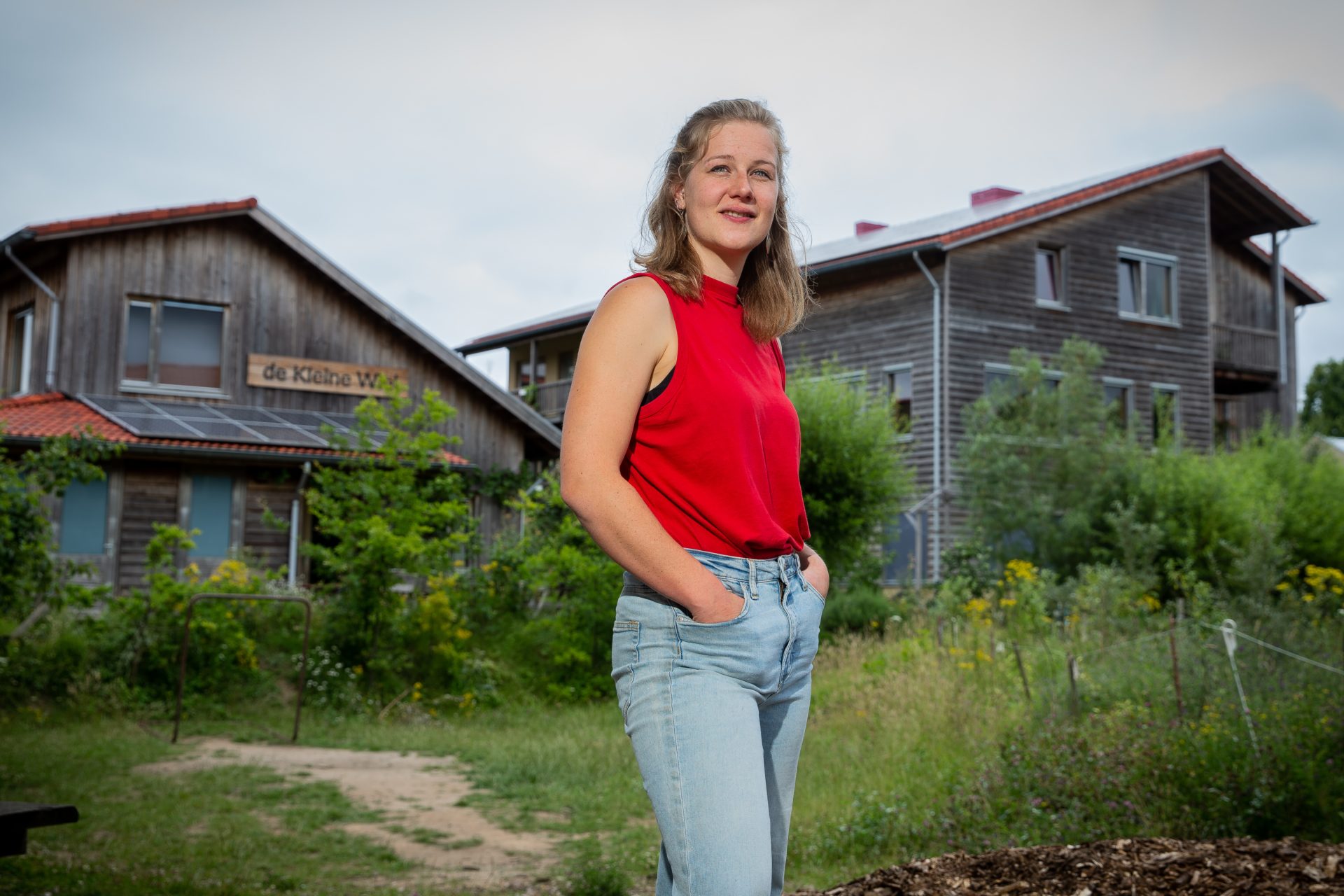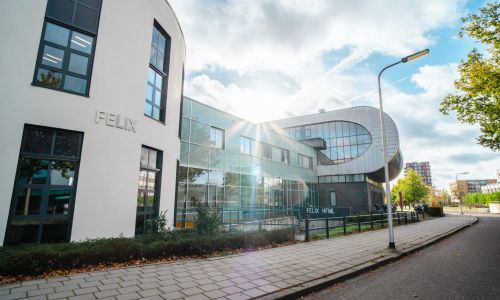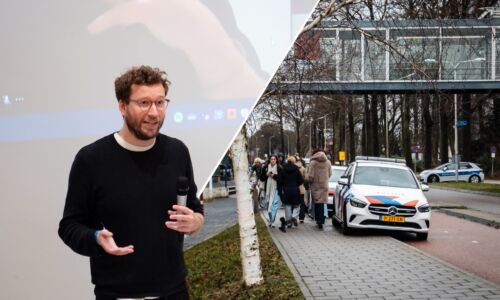Summer interview (10): ‘That injustice, I just feel it’
-
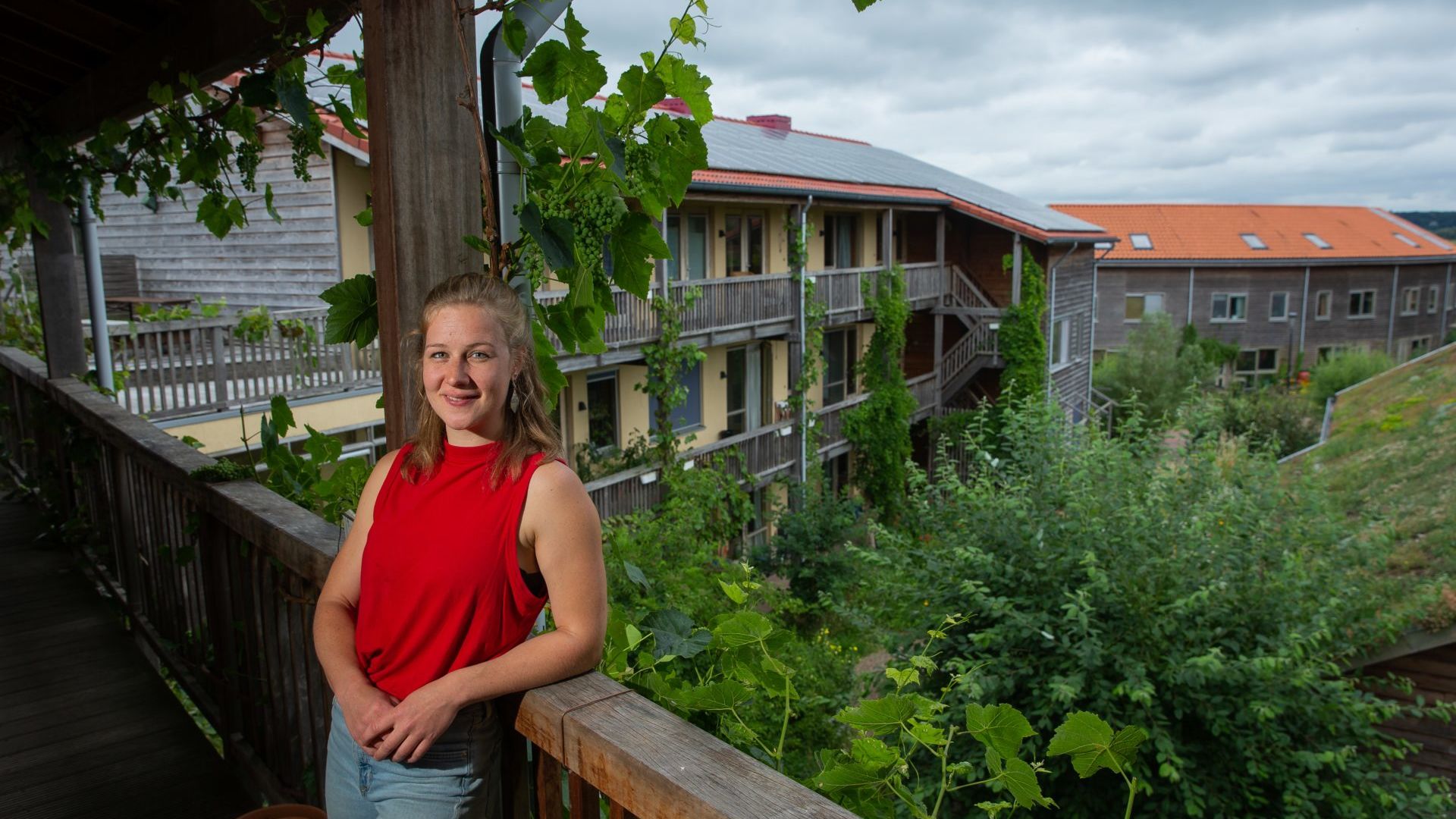 Kiane de Kleijne. Photo: David van Haren
Kiane de Kleijne. Photo: David van Haren
Kiane de Kleijne, PhD candidate and climate researcher at Radboud University, lives in a green residential community near de Waal. At the age of 24, she was already working on the reports of the distinguished UN climate panel IPCC and she is determined to contribute to a sustainable future. ‘I cannot imagine doing anything else.’
Having your own washing machine is a typical example of something you don’t actually need, says Kiane de Kleijne (29) as she shows off the communal laundry room in her residential community. Two large filters hang in a corner — whenever possible, the residents do their laundry with filtered rainwater. There are four machines for about forty residents. ‘Don’t try to do a wash on Saturday mornings,’ says De Kleijne, laughing, ‘but apart from that it’s going great. It is actually quite convenient: often there are several empty machines, and then you can do two washes at the same time.’
The climate scientist has been living in a sustainable residential community in Lent for four and a half years, together with three housemates and their cat Tofu. Iewan — short for ‘Initiatiefgroep Ecologisch Wonen Nijmegen’ (initiative group ecological living Nijmegen) — is the largest straw building in the Netherlands. For De Kleijne, it is not just a residential community, but the realisation of a vision of the future. ‘When people came to live here, they rolled out a big banner with the words ‘Het kan wél’ (it can be done) on it. That is what I like so much about this place, that there is a whole group of people that really believe in it.’
Shared canoe
Washing machines are not the only thing that the residents of Iewan share with each other. Shared cars are parked in front — the residential community discourages private car ownership — and there are shared spare rooms on the ground floor. There is even a shared canoe in the grass next to the bicycle sheds. The rest of the building is also designed with sustainability in mind. Cooking is electric, there is a heat pump for the hot water, and there are enough solar panels for the entire complex on the roofs that have not been planted.
A long strip of reeds grows at the edge of the site: this is the helophyte filter. It is the wastewater treatment system of the complex, which is not connected to the sewage system. Instead, wastewater runs along the roots of the reeds, where root bacteria and layers of gravel purify the water. Iewan residents can then reuse it to flush their toilets. To avoid damaging the roots of the reeds, they all use natural shampoo. ‘It is a very ingenious system,’ says De Kleijne. The water filter does require some maintenance: once in a while, the residents have to prune their purification system.
De Kleijne has never had the feeling that she had to sacrifice comfort for the sake of the climate. After a tour of the complex, she gestures around the living room of her residential group. The house is fully equipped. There is even underfloor heating, powered by a pellet stove that heats the entire complex — that happened to be the most sustainable option. ‘Look,’ she says smiling, ‘when you sit down here, isn’t it super comfortable?’
According to the climate scientist, the idea that comfort and climate do not go together is a myth. Infinite consumption, that’s what is not possible. If we want to stop emitting CO2 by 2050, as the Paris Climate Agreement demands, we must reduce our emissions dramatically now. De Kleijne: ‘It is so drastic that you will have to give up certain things. The lifestyle we have in rich countries, where everything should just be possible, does not fit into a finite world. Holidays by air, for example, are very difficult to make sustainable. And you can’t buy a new smartphone every year, or a new wardrobe every season.’ But living very comfortably day-to-day, in a sustainable way? That’s perfectly possible, the climate scientist says.
Injustice
De Kleijne was born in Brazil, where her parents were involved in development aid. She grew up in the Netherlands, and when she was nine, her parents took her back to visit the country where she was born. She encountered severe poverty for the first time and saw that there were children her age who lived in a completely different world than she did. ‘I have carried that with me ever since,’ says the climate scientist, ‘the awareness that it is not a matter of course that I live here and grew up here.’
‘People in Kenya suffer with extreme drought, while they literally contributed nothing to the problem’
De Kleijne’s passion for climate science was born when she delved into the climate crisis during her studies. ‘The way we treat the earth and each other has really affected me. That injustice has really been a driving force.’ During a trip to Kenya, the researcher spoke with people who are already experiencing the effects of climate change. ‘They suffer with extreme drought, while they literally contributed nothing to the problem. The injustice of that, I just feel it.’
At the age of 24, De Kleijne was already working on a report by the IPCC, the distinguished UN climate panel. She worked on it every day in the year-and-a-half after her Master’s. The pressure was high. ‘I thought: with this report we can really present something that will change the course. We wanted to map out the science as accurately as possible, describe it as well as possible, with insights that are as useful as possible, in order to support policy.’
De Kleijne realised that thinking about the threat of the climate crisis day after day is not easy for anyone. Before you know it, you lose yourself in apocalyptic scenarios of the future. It is precisely an environment like the IPCC, full of climate scientists who understand perfectly well what it means when another paper with bad news is published, that eases the burden a little. ‘It helps to be able to discuss this research with colleagues. And working in that group, with the smartest people I have ever met, who are so motivated to contribute to such a report, that helps too.’
De Kleijne’s own research deals with the environmental impact of technologies aimed at reducing our greenhouse gas emissions. It focuses on technologies such as those that capture CO2 at industrial plants or power stations and then reuse the gas to make plastics or building materials. Ideal for reducing CO2 emissions, you might think. But alas: earlier this year research by De Kleijne and her colleagues showed that in many cases it is too good to be true. This is because recycling CO2 takes a lot of energy, but also because of time-sensitivity. Many technologies are still in infancy, while our greenhouse gas emissions must be reduced at breakneck speed.
The climate scientist has mixed feelings about the results. On the one hand, she is glad that she and her colleagues analysed the technologies before politicians adopted them wholesale. On the other, she would have preferred to say that they are all fantastic innovations. There is so much criticism of sustainable technology already. ‘You hear it constantly. Wind turbines? All well and good, but not in my municipality. Solar panels? They don’t look so great. Electric cars? They don’t drive far enough.’ De Kleijne is afraid that we are waiting for a perfect solution that will never materialise. ‘You can criticise everything, but we do have to get started.’
Always on holiday
After a working day at the university, it is good to come home to Iewan. ‘People who come to visit often say that it always feels like it’s a holiday here,’ says De Kleijne. It undoubtedly has something to do with the lush garden, the chirping birds, and the plant-covered wooden walls. Yet it is mainly the community itself that De Kleijne will miss when she leaves. She will soon move to Arnhem to live with her boyfriend.
‘I think that society is lacking a sense of community’
The residential community consists of about fifty people, from families with children to residential groups like that of De Kleijne. They regularly eat together on the roof terrace, offer each other a helping hand where necessary, and organise a joint chore day once a month. ‘I think that this is sometimes lacking in society,’ says De Kleijne, ‘that sense of community. I really enjoy the chore days, for example. It’s great to roll up your sleeves and work on something together.’
A project like Iewan exists by the grace of that collaboration. Together, the residents run a community centre and a food cooperative, draw up cleaning schedules, and meet once every few months to discuss the ups and downs of the community. It includes questions such as how many private cars the residential community can handle. De Kleijne says that this is one of the more difficult subjects because it touches on personal freedoms. Ideally, the residential community would like to exclusively use shared cars, but in practice this is not feasible for many people. The question is how to determine the limit and what to do if someone wants to buy a car when the limit has already been reached. Yet the residents manage these discussions very well — most of the time, they work it out.
Straw bales
Perhaps this harmony has to do with the kind of person Iewan attracts. Those who aren’t interested in sustainability or community spirit, de Kleijne says, won’t choose to live here. The residents share the same ideals and do not hesitate to roll up their sleeves to achieve them. Even the construction of the complex included countless volunteer hours. Both the first residents and people from outside came to help stack bales of straw beforehand.
In the corridor of the complex, next to the corner with free second-hand goods, stands a cross section of the wooden walls from which Iewan is constructed. They are thick, full of straw, and finished with loam. De Kleijne tells us that the construction of the complex was as sustainable as possible, although some compromises were made to keep costs down. ‘It is still social housing. The initiators wanted to show that it is feasible to build sustainably, even on a large scale.’
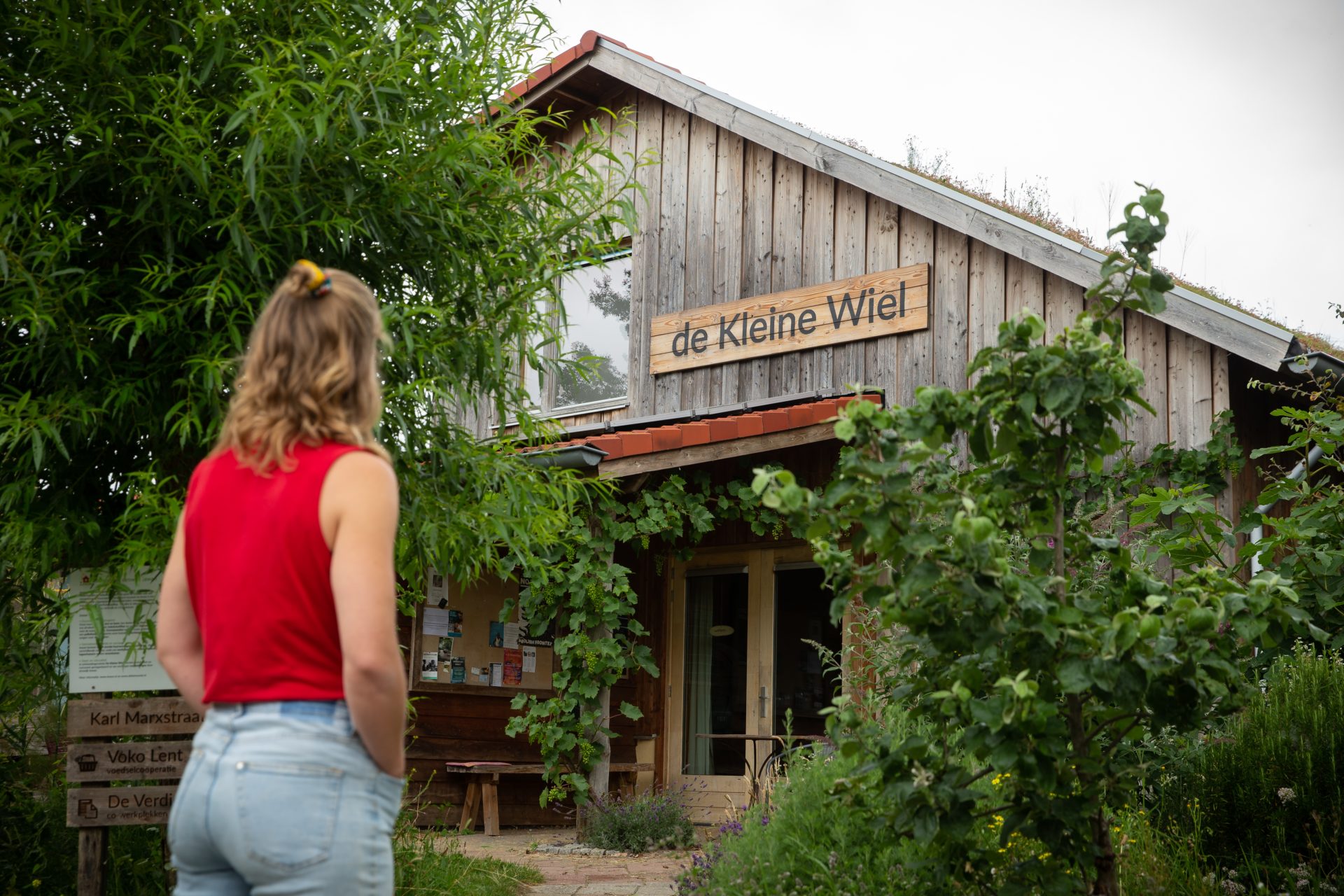
The climate scientists thinks that more sustainable construction is badly needed. ‘That is the difficulty of the climate problem: we need to change things in all aspects of economy and society. In relation to infrastructure, food production, industry, energy production, but also in housing. Everything must become more sustainable. There’s no either/or.’
The idea that we are already too late is not something De Kleijne entertains. ‘That’s throwing in the towel. Yes, if we had started taking drastic measures thirty years sooner, then things could have been very different indeed. But this is where we are now.’ And she says that every little bit counts. If we do not succeed in limiting warming to 1.5 degrees, we must not give up, but go all out for 1.6. ‘Every kilogram of CO2 that we don’t release into the air is a win.’
A blow to the climate
Sometimes, there is friction between De Kleijne’s ideals and her work as a scientist, such as when she boarded a plane to attend a conference in California last May. Not an easy decision. ‘I talked to so many people about it; I think that they were completely done with me after a while. But just look at the emissions of a flight like that. I think about the climate every day: I’m always traveling by bicycle, eating vegan, living as sustainably as possible. And then the climate takes such a blow: it’s just so grating.’ But the conference was too important to miss for her research, she decided in the end, and there was simply no alternative closer to home.
‘I want to contribute something to the solution; I cannot imagine doing anything else’
Ignoring these concerns is not an option for De Kleijne. ‘I think we all have a responsibility to think very carefully about our choices. Of course, you cannot expect people to live without emissions — that is not possible in today’s society. That is why personal change must go hand in hand with systemic change. But I do try to live as sustainably as possible.’
De Kleijne will continue to work on her PhD thesis for the next eighteen months; all options are open after that. She may stay in science; she may want to work on sustainability policy. One thing is certain: she will remain committed to climate justice. ‘I want to contribute something to the solution; I cannot imagine doing anything else.’
If possible, she will live in a green residential community again in the future. Her preference would be to set one up herself; she has already gone over the possibilities with a group of friends. It is not easy — just try and find a piece of land and sufficient sustainable materials, which have risen sharply in price over the last two years. Nevertheless, De Kleijne is confident that her plan will succeed. ‘I think that there will be new roads to take. It’s a question of keeping our eyes open, with a broad outlook, and seeing what comes our way.’
Translated by Radboud in’to Languages.
